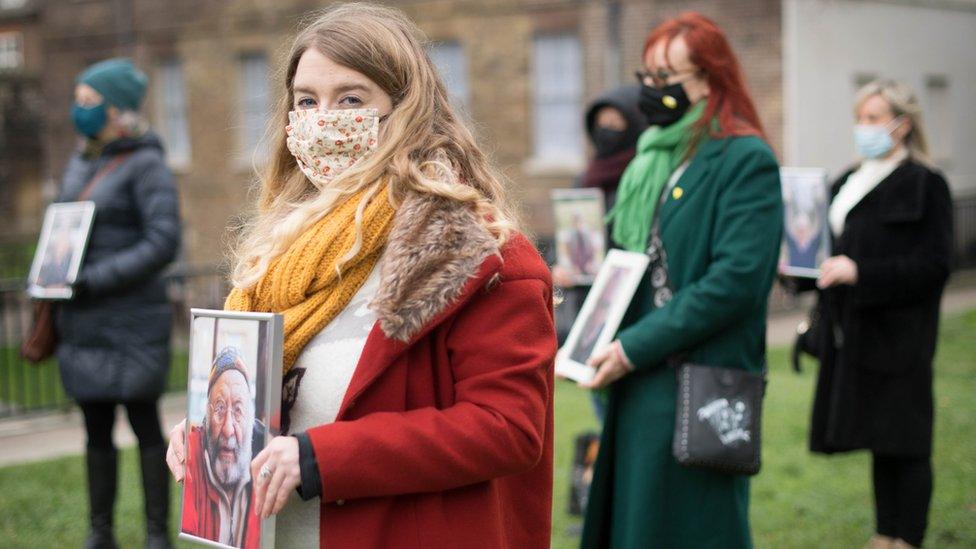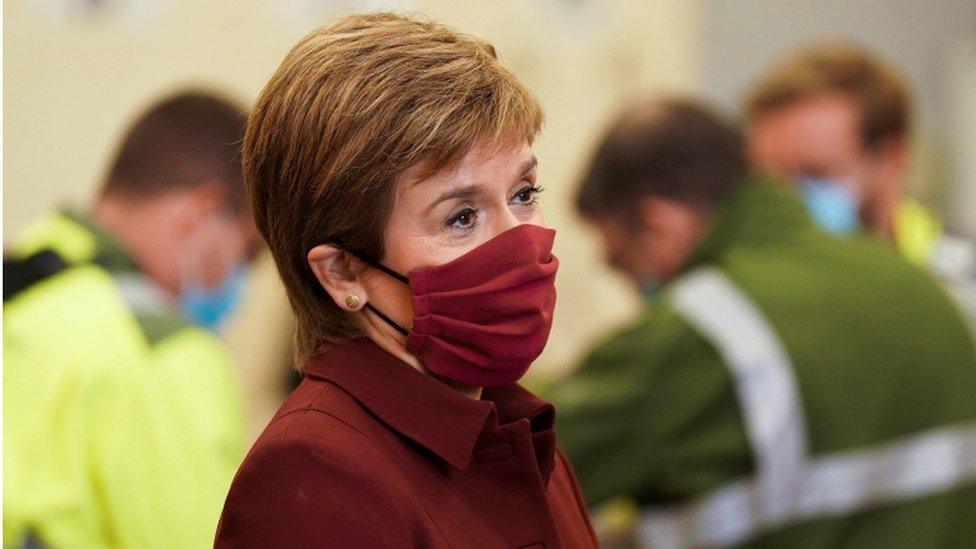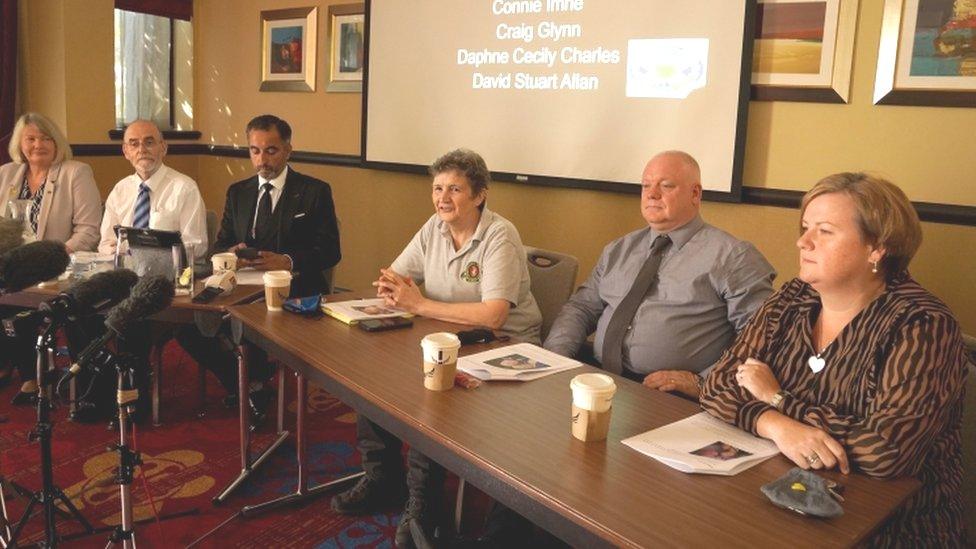Scottish Covid inquiry to start later this year
- Published

Covid-19 has been mentioned on the death certificate of nearly 10,500 people in Scotland
Scotland is to hold its own public inquiry into the handling of the Covid pandemic by the end of the year, the Scottish government has confirmed.
The announcement follows pressure from relatives of some who have died.
The inquiry will scrutinise decisions that were taken over the course of the crisis, with the aim of learning lessons for any future pandemics.
First Minister Nicola Sturgeon had previously said her preference was for a UK-wide inquiry to be held.
But Prime Minister Boris Johnson told MPs in May that an independent public inquiry examining the handling of the pandemic across all four UK nations would not begin until the spring of next year, despite Ms Sturgeon calling for it to start this year.
Campaigners from the Covid-19 Bereaved Families for Justice group said a separate Scottish inquiry was needed to examine decisions made by the devolved Scottish government, and to hold it to account.
Deputy First Minister John Swinney met representatives of the group shortly before the announcement was made.
Almost 10,500 deaths have been registered in Scotland where Covid-19 was mentioned on the death certificate since the pandemic began.
The Scottish government is inviting people to give their views on the aims and principles of the public inquiry by 30 September.
It said particular consideration would be given to the "four harms" of the pandemic:
Direct health impacts of Covid-19, including cases and deaths in care homes
Other non-Covid health impacts
Societal impacts, including education
Economic impacts
It will also investigate "events causing public concern", for example the high number of deaths in care homes, and will examine the explanations of the decisions that were taken and the causes of "anything which may not have gone as expected".
First Minister Nicola Sturgeon and former Health Secretary Jeane Freeman have both admitted that the way elderly people were discharged from hospitals into care homes at the start of the pandemic was a mistake.
More than 1,300 elderly people were sent to care homes before a robust testing regime was in place.
Ms Sturgeon told her Covid briefing on Tuesday: "The inquiry will look at all matters related to the handling of the pandemic that are within our devolved competence.
"This will include of course the situation in our care homes."
Donald Macaskill, the chief executive of Scottish Care, the representative body for Scotland's independent care homes, told BBC Scotland the desire to protect the NHS did not appear to have included social care, which was treated as a second class citizen.
He criticised the lack of planning and support with protective equipment (PPE) and said the inquiry needed to look at whether it was "realistic" to expect residential care homes to follow infection control procedures which were as stringent as an acute hospital setting.
Asked if care homes would make financial pay-outs to the families of people who went into care homes Covid-free and died from the virus, Mr Macaskill said: "I have no doubt that if there is culpability on the part of a care home provider then appropriate action will be taken - but if that culpability rests with government, with the NHS, with other parts of the system then I think that is a more fundamental question the inquiry will explore."

Ms Sturgeon has admitted that the way elderly people were discharged from hospital to care homes in the early stages of the pandemic was a mistake
In her briefing, Ms Sturgeon stressed that the Scottish government would "liaise closely" with the UK government and the other devolved administrations on the likely terms of a UK wide inquiry to "avoid duplication and overlap".
She added: "The need for co-operation with other governments is not in my view a reason to delay the establishment of our own inquiry.
"I do believe a full public inquiry has an extremely important role to play, both in scrutinising the decisions that we took and indeed continue to take in the course of the pandemic, but also of course in identifying and learning appropriate lessons for the future."
The government said the announcement met its commitment to begin to take the necessary steps to establish a public inquiry within its first 100 days in office after the Holyrood election.
Discussions are also under way to identify and appoint a judge to chair the inquiry.
Solicitor Aamer Anwar, who is acting on behalf of members of Covid-19 Bereaved Families for Justice, welcomed the announcement but said the public inquiry must be truly independent and leave no stone unturned.
And he said grieving families must be at the heart of the inquiry process if it is to be effective and meaningful.
Mr Anwar also urged the prime minister to follow the Scottish government's lead and bring forward a UK-wide inquiry.

Members of the Covid-19 Bereaved Families for Justice group welcomed the announcement at an event in Glasgow
Peter McMahon, who lost his wife Debbie to coronavirus at the age of 53 from coronavirus, was one of the campaigners who watched the first minister announce the inquiry, which he said was "very welcome".
He added: "My wife Debbie, along with thousands of others, died what I see as an avoidable death.
"I would like this public inquiry to confirm who took certain decisions, clarify why they were taken, especially around the ending of shielding in July 2020."
Scottish Conservative health spokeswoman Annie Wells said the inquiry must uncover what went wrong throughout the pandemic, especially in care homes.
She added: "It's a disgrace that they are only getting around to this now, when Nicola Sturgeon promised it would be a priority during the election campaign.
"Major errors were made by the SNP government that left our most vulnerable citizens unprotected."
Scottish Labour leader Anas Sarwar said the Scottish government had been "dragging their feet, ignoring the pain of the grieving families and sacrifices of thousands of key workers".
He said: "The first minister must end the dither and delay and act now so that light can be shone on the Scottish government's handling of the pandemic, lessons can be learned, and justice can be done."
Scottish Liberal Democrat leader Alex Cole-Hamilton said: "Last summer, the Scottish government mismanaged quarantine and the return of students to campus allowing the virus to be re-seeded. Test and Protect was unprepared for the pressure of restrictions easing and tracing collapsed. People were discharged in their thousands from hospitals to care homes without tests or even after testing positive.
"This needs to be an avenue to accountability and responsibility for what happened in Scotland."
Scottish Greens co-leader Lorna Slater said: "It's vital that the government's handling of the pandemic is subject to the most thorough scrutiny, and that's why this inquiry is so necessary.
"It's essential that we establish how the country could have been better prepared, and learn every lesson possible, to ensure we are in a better position to handle future public health crises."
It comes as the number of daily cases of the virus in Scotland reached a new record high of 4,323 on Tuesday, with Ms Sturgeon saying that she cannot rule out having to reintroduce "limited and proportionate" restrictions.
The number of new cases has more than doubled over the past week, with Ms Sturgeon warning that the country was at another "fragile and pivotal moment" in the pandemic.
A total of 364 people were in hospital on Monday with recently confirmed Covid-19, up by eight on the previous day, with 43 patients in intensive care, up two.